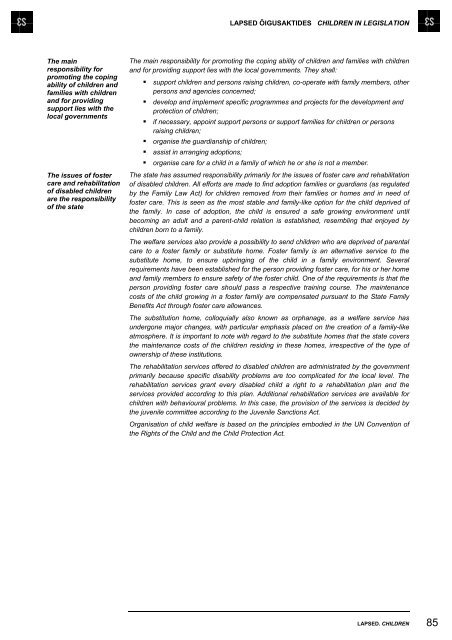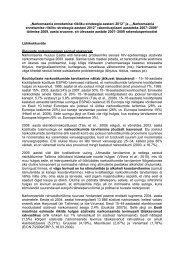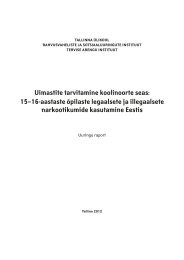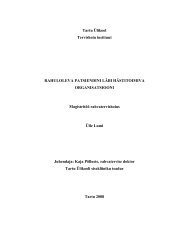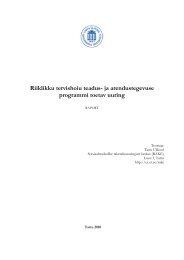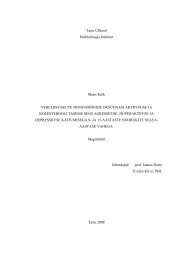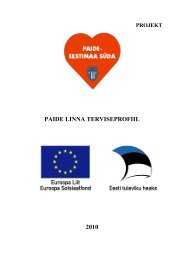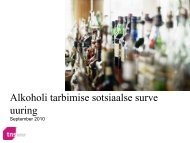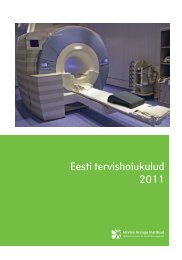LAPSED CHILDREN - Tartu Ãlikool
LAPSED CHILDREN - Tartu Ãlikool
LAPSED CHILDREN - Tartu Ãlikool
- No tags were found...
You also want an ePaper? Increase the reach of your titles
YUMPU automatically turns print PDFs into web optimized ePapers that Google loves.
<strong>LAPSED</strong> ÕIGUSAKTIDES <strong>CHILDREN</strong> IN LEGISLATION<br />
The main<br />
responsibility for<br />
promoting the coping<br />
ability of children and<br />
families with children<br />
and for providing<br />
support lies with the<br />
local governments<br />
The issues of foster<br />
care and rehabilitation<br />
of disabled children<br />
are the responsibility<br />
of the state<br />
The main responsibility for promoting the coping ability of children and families with children<br />
and for providing support lies with the local governments. They shall:<br />
• support children and persons raising children, co-operate with family members, other<br />
persons and agencies concerned;<br />
• develop and implement specific programmes and projects for the development and<br />
protection of children;<br />
• if necessary, appoint support persons or support families for children or persons<br />
raising children;<br />
• organise the guardianship of children;<br />
• assist in arranging adoptions;<br />
• organise care for a child in a family of which he or she is not a member.<br />
The state has assumed responsibility primarily for the issues of foster care and rehabilitation<br />
of disabled children. All efforts are made to find adoption families or guardians (as regulated<br />
by the Family Law Act) for children removed from their families or homes and in need of<br />
foster care. This is seen as the most stable and family-like option for the child deprived of<br />
the family. In case of adoption, the child is ensured a safe growing environment until<br />
becoming an adult and a parent-child relation is established, resembling that enjoyed by<br />
children born to a family.<br />
The welfare services also provide a possibility to send children who are deprived of parental<br />
care to a foster family or substitute home. Foster family is an alternative service to the<br />
substitute home, to ensure upbringing of the child in a family environment. Several<br />
requirements have been established for the person providing foster care, for his or her home<br />
and family members to ensure safety of the foster child. One of the requirements is that the<br />
person providing foster care should pass a respective training course. The maintenance<br />
costs of the child growing in a foster family are compensated pursuant to the State Family<br />
Benefits Act through foster care allowances.<br />
The substitution home, colloquially also known as orphanage, as a welfare service has<br />
undergone major changes, with particular emphasis placed on the creation of a family-like<br />
atmosphere. It is important to note with regard to the substitute homes that the state covers<br />
the maintenance costs of the children residing in these homes, irrespective of the type of<br />
ownership of these institutions.<br />
The rehabilitation services offered to disabled children are administrated by the government<br />
primarily because specific disability problems are too complicated for the local level. The<br />
rehabilitation services grant every disabled child a right to a rehabilitation plan and the<br />
services provided according to this plan. Additional rehabilitation services are available for<br />
children with behavioural problems. In this case, the provision of the services is decided by<br />
the juvenile committee according to the Juvenile Sanctions Act.<br />
Organisation of child welfare is based on the principles embodied in the UN Convention of<br />
the Rights of the Child and the Child Protection Act.<br />
<strong>LAPSED</strong>. <strong>CHILDREN</strong> 85


